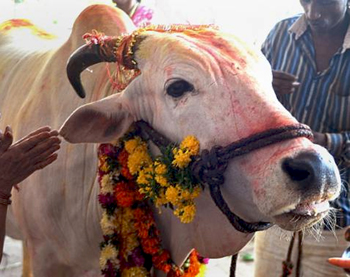Mumbai, Mar 12: The ruling BJP in Maharashtra was left red-faced in the state legislative assembly on Thursday by one of its own MLAs who criticised the government over its beef ban, saying that it was not in the interest of farmers.

“In times of drought, feeding productive animals itself is a big challenge for farmers. How can a farmer sustain the additional burden of looking after spent cattle?” asked Dhonde.
The controversial beef ban, which was imposed by the Maharashtra government last March, has been opposed before, but this is perhaps the first time that a ruling party MLA has openly spoken against it.
Dhonde was with the Congress until 2014 when he switched to the BJP that March, just before the Lok Sabha polls. In the assembly polls held subsequently, he defeated former state minister Suresh Dhas of the NCP.
This is Dhonde's second term as an MLA from the Ashti constituency in Beed, which is one of the worst affected by drought.
Dhonde's criticism comes two days after the Centre's Chief Economic Advisor Arvind Subramanian quipped in Mumbai that he would not comment on the state's beef ban as it would cost him his job.
On Tuesday, asked to comment on the economic impact of the ban during an interaction with students at Mumbai University, Subramanian said: “You know that if I answer this question, I will lose my job. But thank you nevertheless for asking this question.”




Comments
It is better for government to impose ban on beef as it is not at all good for health.....Moton is a good meat and healthy...
Without distributing the Ambani wealth to poor you cant impose ban on anything. Poor people are suffering because of rich Fadnavi who has easy access to all sort of food. I'm used to mutton now. Even if you allow me to eat beef i wont.
There intention is not to snatch snatch away the meat of export from their leaders.
Beef ban increased beef export. Hence, my guess, the farmers must be selling cows to the exporters. It is very clear that the present administration is anti poor. Election in the corner will woke him up now.
dear avish, the loan burden and no food make the people to sucide. Do you say that the life of cow is more important than the human being? he can sell the cow if he want he can save his parents and family. If not all them should be opt for sucide. So parents sake and family sake he is ready to sell the other things which is not necessary at that moment. But people like you who think that more educated ( not being a human) think another way. It will be understandable only when your are in same situation
Dear Kumel are you educated? how the cow becomes your mother. Please check your DNA. We have never seen even in any holy books that the human being is born by Cow.
Another prime example for dirty politics from BJP since Assembly electioons are on the corner, please do not react or comment
Mr kumel,Who you are to feed 17 cr people. Who is parasitic?.mind your language.
Any action in this regard to be implemented immediately before beef eater communities are used to alternative diet, most of them now used to mutton and chicken, After that if we want sell we will never find anyone to buy it.
I think we have to ask all farmers to bring all their spent cattles to Mr. Kumel Chang house. He will look after these mother cows.
I guess he'd be willing to let go of his parents and family as and when they become nonproductive. What a loser!
So parents are cattle? People like you will use any analogy to stick to your stand. Don't impose your ideas on the rural folks. They know exactly what they are doing and what to do with their life, diet, animals, crops etc. India is a non vegetarian country. Get used to it
If we can feed 17 crore parasitic population of jihadis, surely we can feed the holy mother cow
Very well said, I came from an agricultural family too and they have similar practice. I remember Bangalore in the 80's and the menace of cows roaming on the road. Then the IT boom happened and \ban\" we dont see them anymore and they are now sold as beef."
Add new comment